Everything you need to know about glass pool fencing in New Zealand
Written by
29 November 2020
•
12 min read
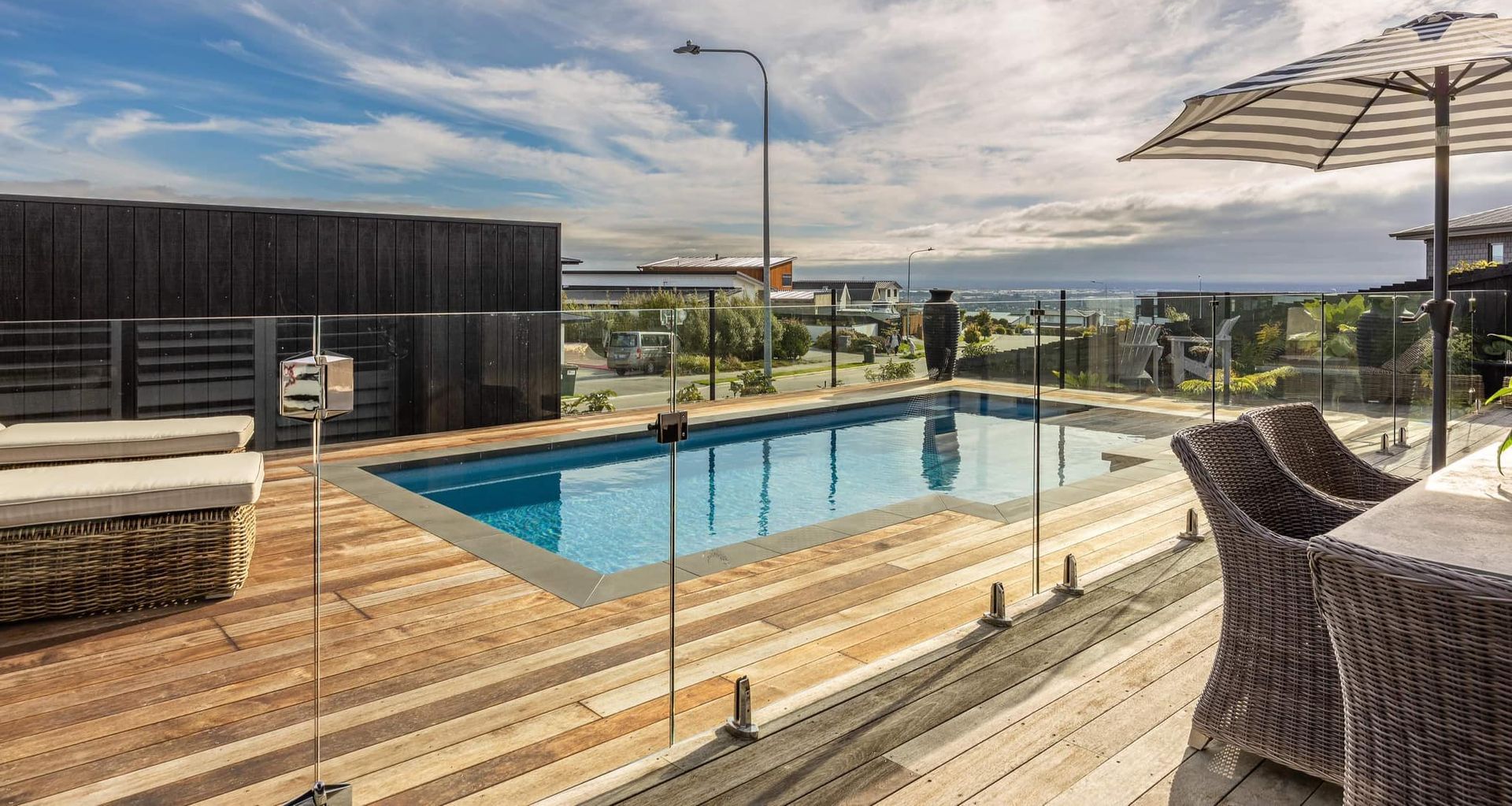
There are many benefits when choosing a glass pool fencing system including practical aspects like durability and safety as well as style and aesthetics. However, with alternatives like timber, steel and composite fencing also available you need to be sure a glass pool fence is the most suitable option for your situation.
What is glass pool fencing?
At a fundamental level, glass pool fencing is a convenient way to secure swimming pools, including commercial and residential pools, without disturbing the view. A glass pool fence typically features reinforced glass panels, with or without a frame, but is always anchored at a base.
Developed using the latest technology, materials and manufacturing techniques, they are now also incredibly robust and secure. With options like frameless glass pool solutions and premium hydraulic hinges, there's a wealth of additional features and benefits to enjoy.
How strong is glass pool fencing?
Despite its delicate look, this glass pool fencing is sturdy and robust. A powerful wind might shake the glass panels, but the toughened glass supported by equally strong stainless steel connectors can easily withstand a much stronger force. There are variations in strength too, for example, tempered safety glass, which is often used for glass pool fencing, is up to six times stronger than regular glass.
Related article: Swimming pool designs that are shaping the outdoor living spaces in our homes
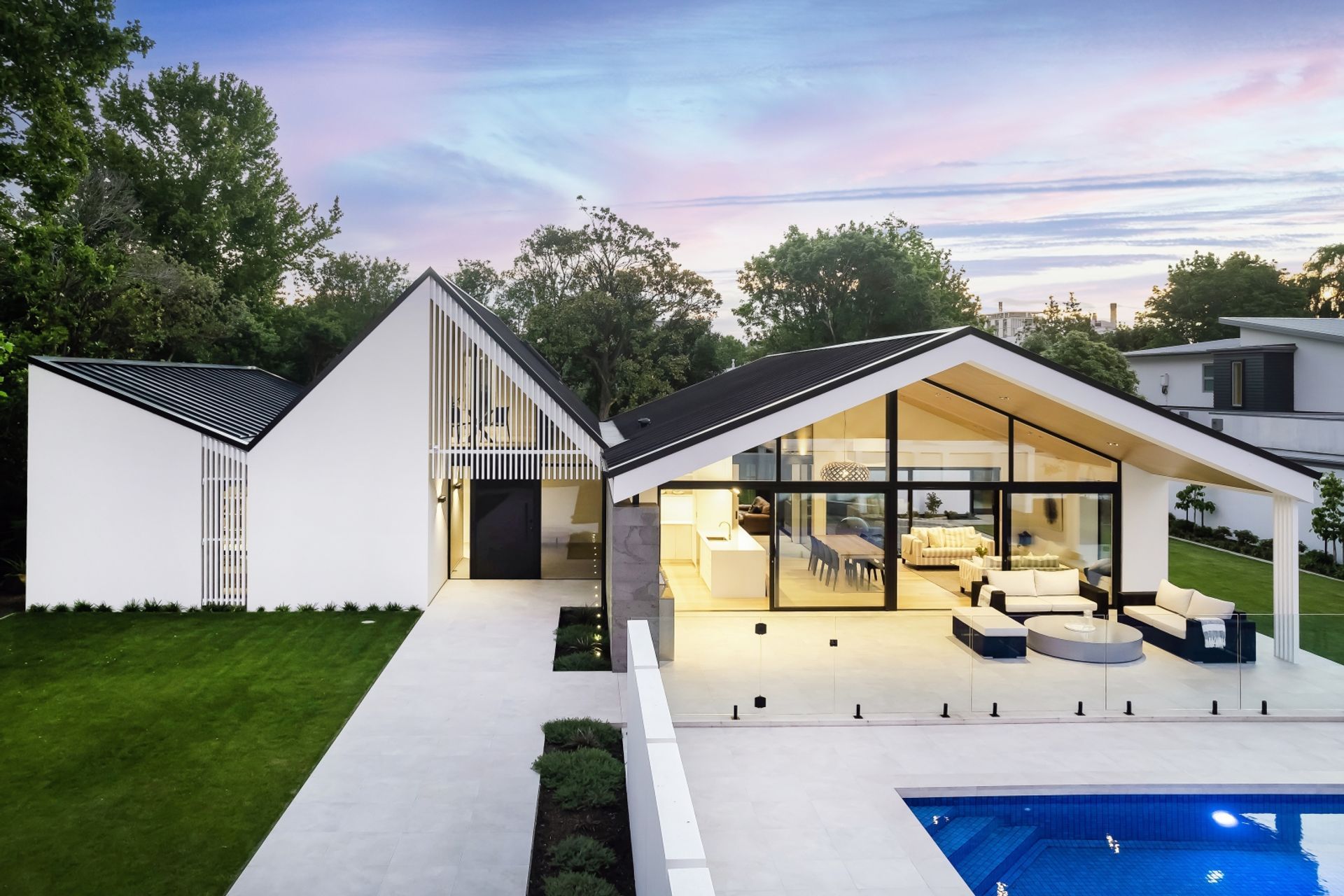
What are the advantages and disadvantages of glass pool fencing?
The pros and cons here are mostly common sense but there are a few that may surprise you making it particularly important to pay attention to them all.
The advantages of a glass pool fence
Safety and durability
With improved materials and high-quality glass now readily available, these fencing solutions are stronger than ever. Transparent options also have the bonus of giving parents an unobstructed view of their kids as they play.
Versatility and aesthetics
A modern and sophisticated aesthetic can be easily achieved for a pool area with the delicate touch that glass offers. It also makes an outdoor space feel more open and airy. In terms of versatility, you'll find a number of different types to choose from (more on this later) and various glass options as well.
Low maintenance and upkeep
The strength and durability of glass make it very low maintenance with little care and attention required. Besides some basic cleaning, there's not much more you'll have to worry about, especially when compared to the upkeep of alternatives like wood.
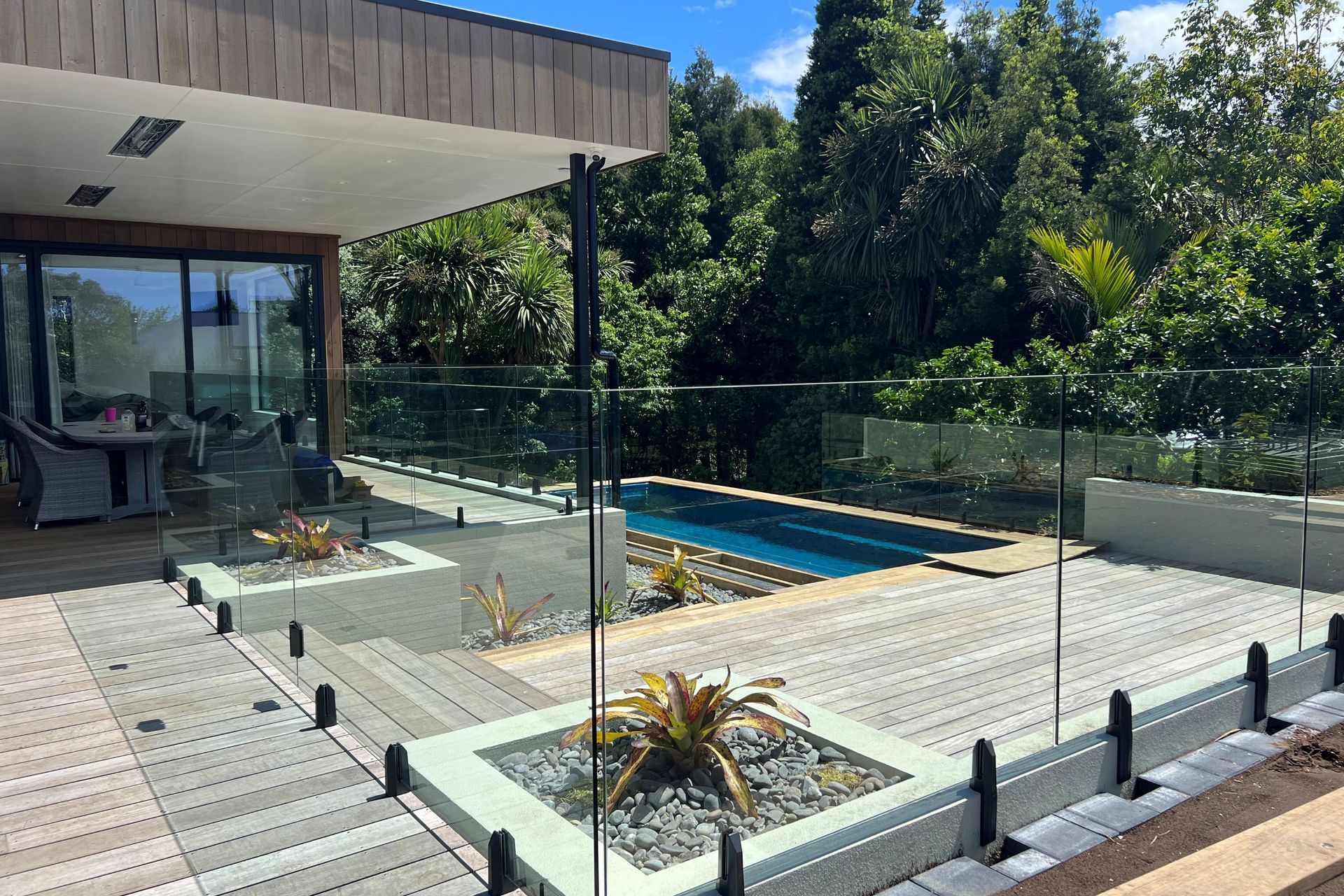
The disadvantages of a glass pool fence
Cost and installation
The initial cost of the product is generally higher compared to other options you might be considering. The cost of installation needs to be also added onto this, which can again be a little higher due to the expertise required. The quality and longevity of the product do provide a strong return on investment.
Fragility
In the unlikely event of a very high impact, glass can shatter which can be concerning. However, modern-day options like toughened glass and laminated glass are designed with this in mind, engineered to minimise injury or harm when this happens.
Privacy
The transparency of glass creates an open feel but this does come at the obvious expense of privacy. If you live in an area that is relatively built up then you may want to complement your glass panel fence with some shade and shelter solutions.
Related article: Superb pools for small spaces in New Zealand
How much does glass pool fencing cost?
The price for framed glass fencing starts at $630 per square metre in New Zealand. It’s followed by the cost of semi-framed, starting at $885 per square metre. For high-quality frameless glass pool fencing, you will need at least $1,150 per square metre, on average.
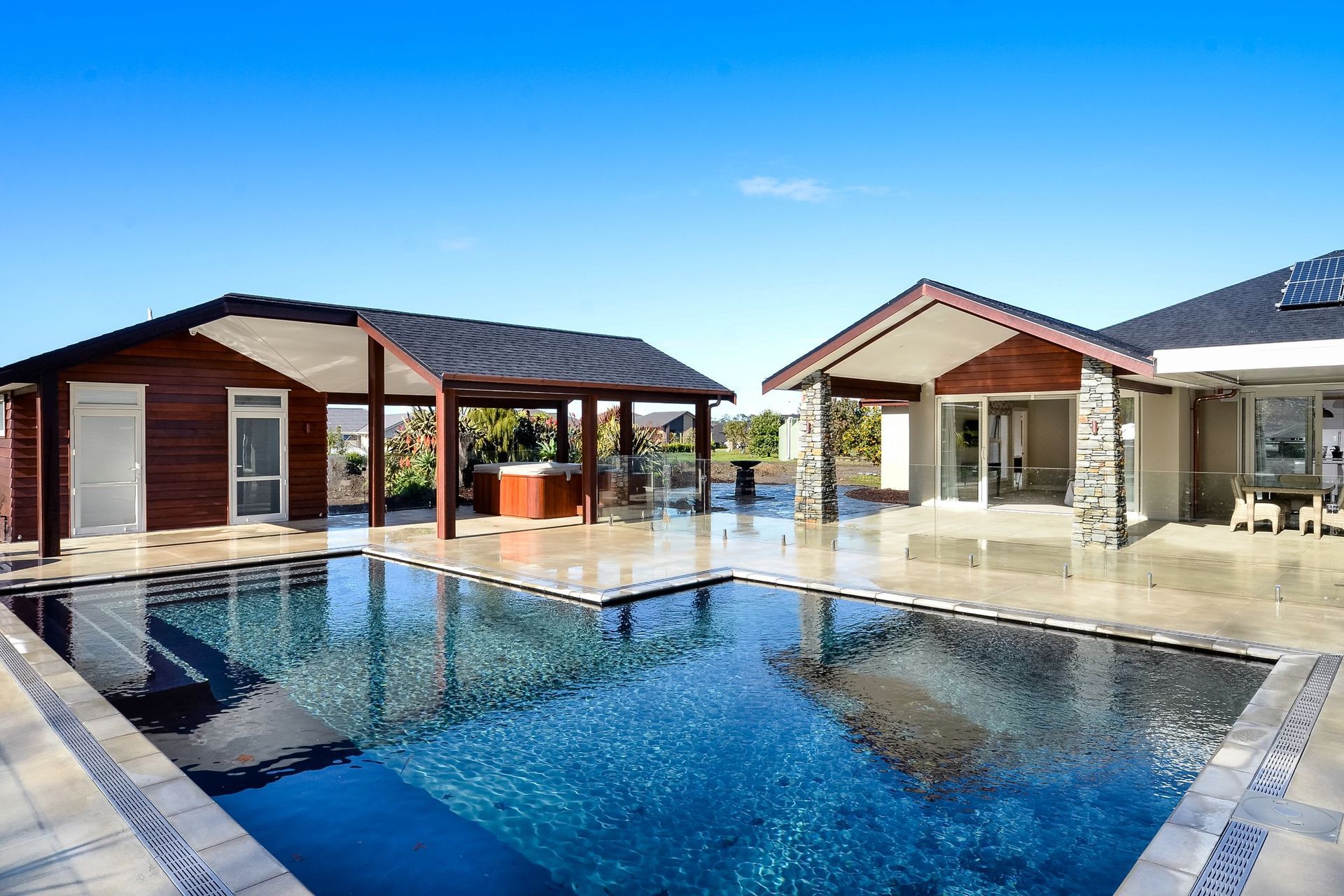
The different types of glass pool fencing systems
The first decision you'll make if you decide on a glass pool fence as an option is on the type of system you'll choose, briefly discussed in the costs just mentioned. There are a few key differences between each which are important to understand in some detail.
Framed glass pool fencing
The most common type of glass fencing system comprises standard glass panes and stainless steel posts that secure them in place. Usually, the posts or frames are fixed securely into the ground first. After the panels are inserted in position, a top bar is added to ensure that the fence is completely locked and fastened.
Semi-framed glass pool fencing
This midway solution presents a compromise between the traditional format and a modern allure. Glass fencing panels remain attached to posts fixed into the ground, but the framing is minimised to encompass only the necessary area. A handrail might be featured at the top.
Frameless glass pool fencing
Frameless glass fencing is a smart, modern solution for situations when a discreet barrier is required. This type of fencing is nearly invisible since it features no metal shell or visible joints, but only a series of almost floating panels. In other words, it provides an effective barrier for your pool area but not for your eyes.
Besides unobstructed landscaping and improved kerb appeal, frameless glass pool fencing also allows you to keep an eye on your children at all times.
There are three different ways to install a frameless swimming pool fence.
- Spigot-fixed: The panels are bolted to the surface with high-quality stainless steel plugs.
- Slot-fixed: Provides a feeling of glass emerging from underground since that’s where the slots are.
- Button-fixed: Installation fixes panels below the ground by attaching bolts at strategic locations.
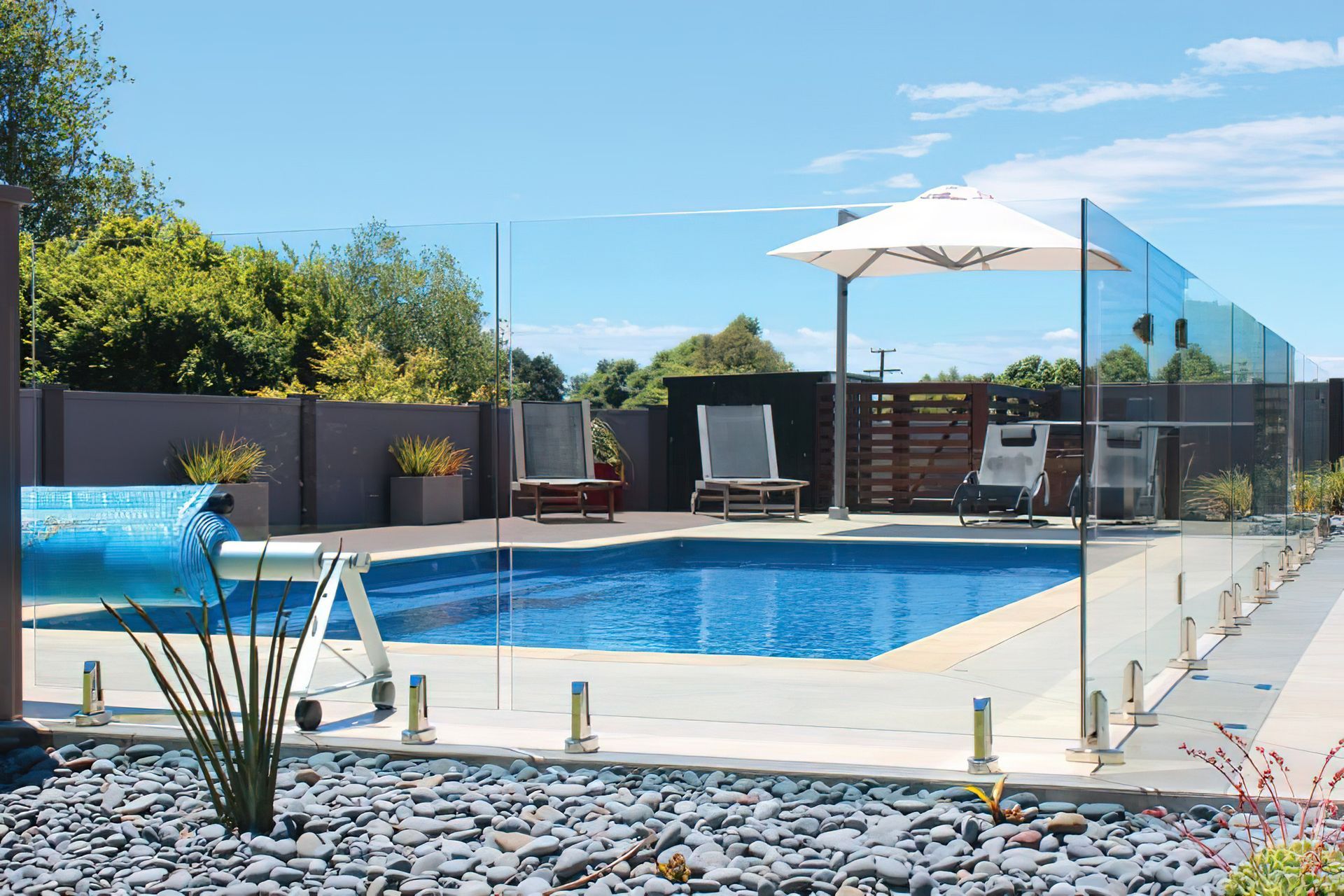
Different types of glass to consider
You'll often also have a decision to make about the type of glass that goes with whatever type of system you choose, though some may be prescribed. The options when they are available to you are as follows and vary in appearance and performance.
Clear or frosted glass
If privacy is your goal, then a frosted glass barrier will be an excellent solution. It will block curious eyes and give you peace of mind. On the other hand, if you wish to secure the pool area but preserve the views, clear glass is the logical choice. The only other real factor with respect to these two options is cleanliness as clear glass will show up smudges and dirt more obviously than frosted.
Toughened glass
Also known as tempered glass, toughened glass is popular for pool fencing due to its safety features and characteristics. It is manufactured by heating glass and then rapidly cooling it, resulting in a strong and durable material. Toughened glass is designed to break into small, less dangerous fragments if it is subjected to significant force.
Laminated glass
Laminated glass is made of two or more layers of glass with an interlayer of plastic (usually polyvinyl butyral) between them. This keeps the glass together reducing the risk of injury if it shatters. Laminated glass is much thicker and provides additional safety and security benefits, often used in areas where there is a higher risk of impact like an outdoor space where children are likely to play.
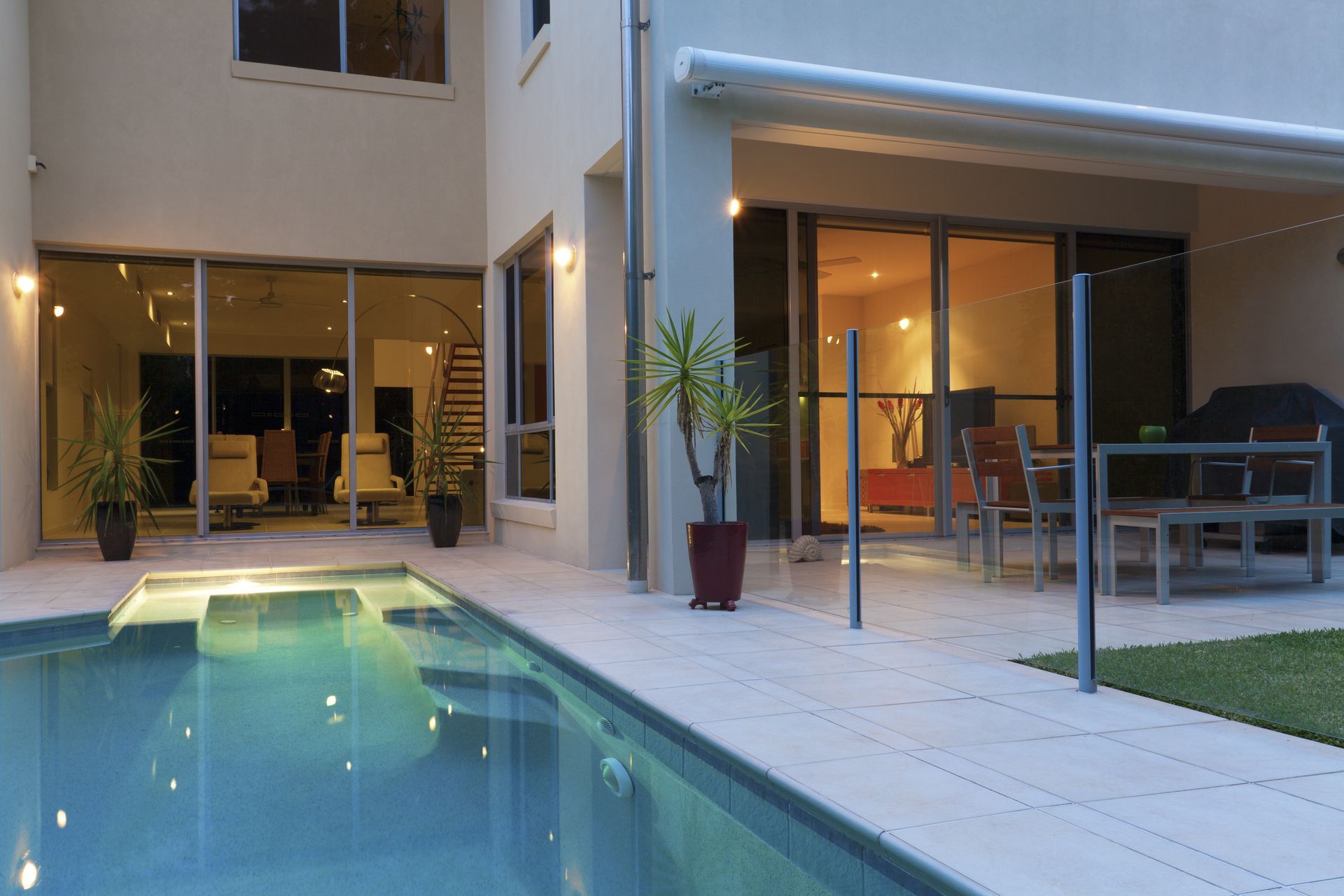
How to maintain a glass pool fence
Glass pool fences do not require extensive maintenance and in most cases, occasional basic cleaning will suffice. The great thing is that you won't need a professional cleaning service or highly specialised cleaning products.
The best way to clean a glass pool fence is fairly simple. All it takes is some water and regular liquid soap or glass cleaner. Use a soft sponge and avoid any rough scrubbers that might scratch the surface. After rinsing, you can either use a dry cloth like a microfibre towel to remove the excess water.
Repeat the process every three to six months, more frequently if the pool is in heavy use.
Glass pool fencing needs no refinishing or upkeep. If you add a self-cleaning glass coating which is often available, your maintenance duties could turn from occasional to nearly non-existent.
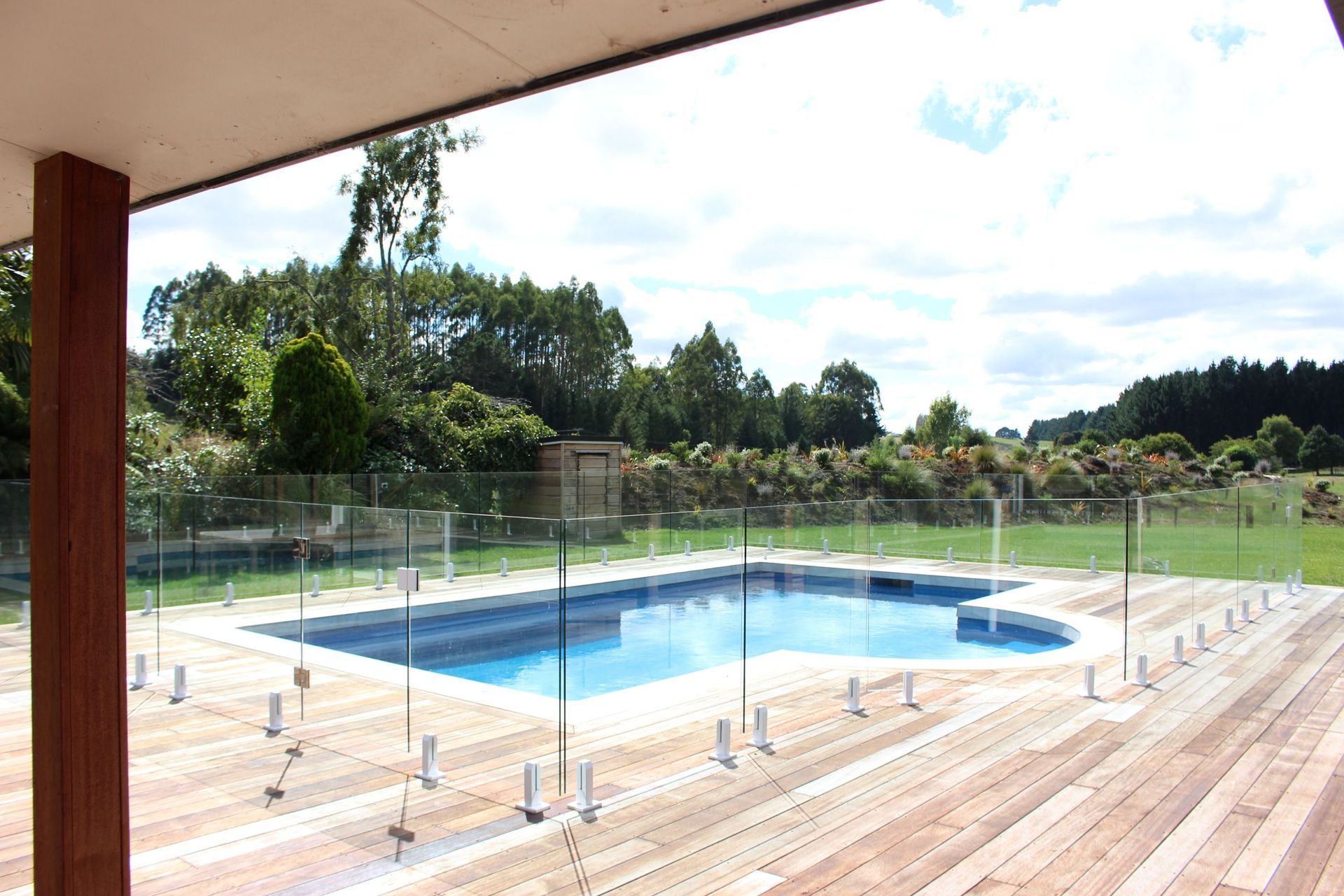
Pool fencing regulations in New Zealand
Until 2017, a swimming pool was subject to the Swimming Pools Act 1987, however, they have now incorporated child safety provisions for residential swimming pools into the Building Act 2004.
By law, a swimming pool must have a barrier that restricts access to children younger than five years of age. This applies to any kind of pool with a depth of over 400mm. The Building Code also requires self-closing doors in the pool barrier, ideally with audible alarms.
Before installing a swimming pool fence, you will need a building consent. Authorities can issue a notice to fix a non-complying pool, followed by a possibility of infringement or prosecution.
Glass pool fencing must not feature any gaps that exceed 100mm in or under it. This rule also applies to pet doors. A minimum height of 1.2m is required above the ground and over and above any permanent projection including raised gardens, retaining walls, etc. Additionally, horizontal rails should be at least 900mm apart with all fencing supports placed on the inside to disable climbing in.
For more details look at the pool fencing requirements under the NZ Building Act 2004.
Related article: The cost of fencing in New Zealand — types, materials and more
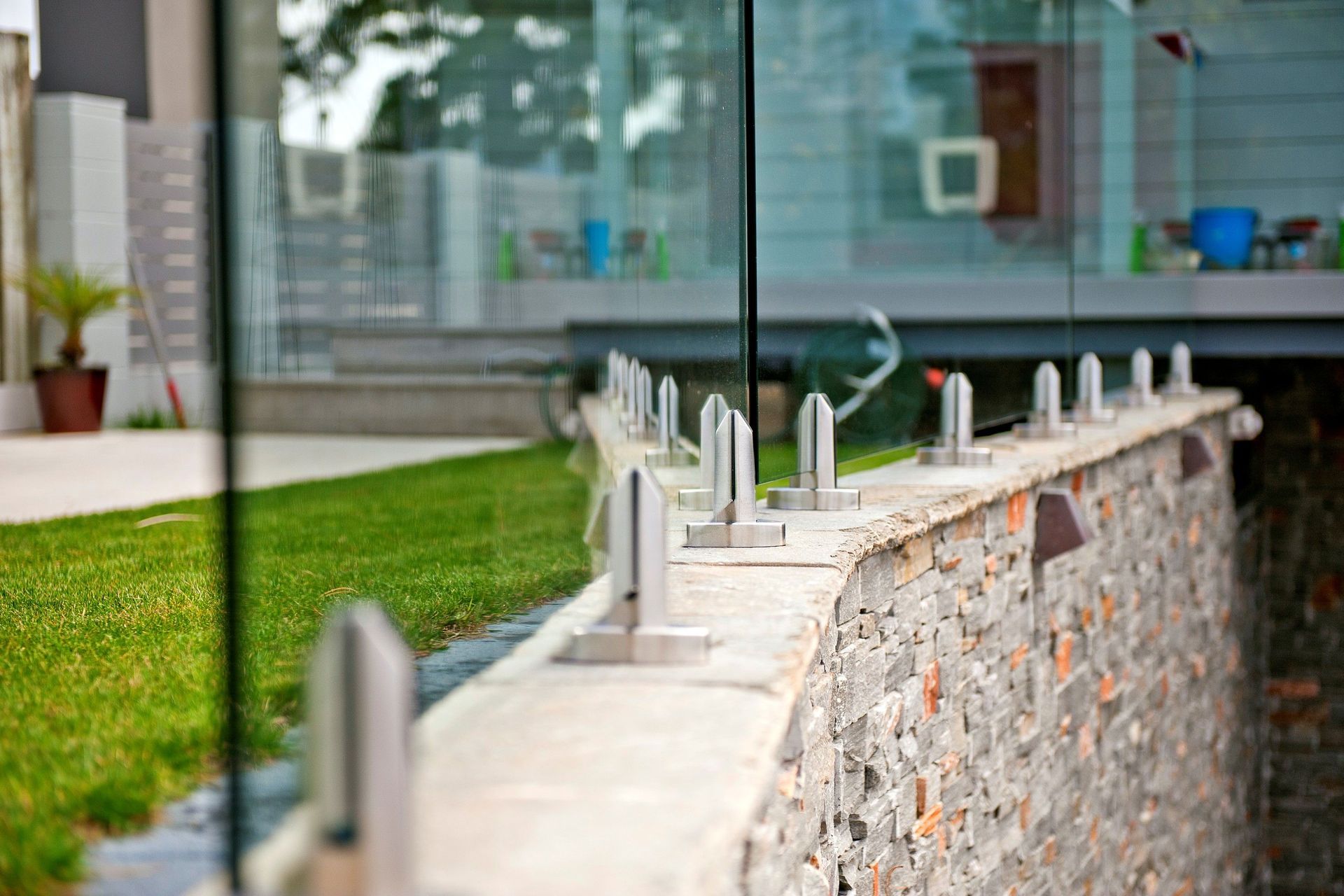
How to choose the right glass pool fence
Now you have all the information you need, the final step is about bringing it all together in a process so you end up with the best option for your home. The following steps
1. Prioritise safety
Safety is paramount when it comes to any pool fencing project, making it the first thing to prioritise. You want to be sure that any solution you go for is going to keep everyone safe when in use, and when not. Familiarising yourself with the aforementioned fencing regulations is important before shifting to a focus on the solutions themselves.
The quality and strength of the glass is a key area here. Try to get an understanding of this in terms of the potential impact it can withstand. You'll also want to know how it reacts to breakage, especially if its near a kids play area.
2. Choose the right style
While glass pool fencing lends itself to a contemporary minimalist style, there are still a few aspects where aesthetics has an influence. The first is in the style of the glass and whether you go for clear, frosted or a combination of the two. There is also the option of glass tinting which has the added benefit of reducing glare and heat.
There is also the look and design of the different framed, semi-frameless and frameless options you'll see and how much you want these features to draw the eye. When examining these, don't underestimate the visual impact of the spigots, clamps, bolts and buttons that secure the panels either, particularly with frameless glass options. They may be small but they can still stand out, especially with a clear glass option.
3. Think about ongoing maintenance
While we've already acknowledged that the ongoing maintenance for this type of fencing is small, it should still be addressed during your decision making process. This is partly a conversation about quality, durability and resistance to breakages but also one about coatings that are available.
These coatings will often come at a premium but they can effectively reduce cleaning time quite considerably. This is particularly relevant if you're fencing off a large pool area which will potentially take a long time to clean by hand.
4. Understand your costs
Your budget will have a big impact on what products and solutions you can consider for your home. Having assessed your needs from a safety, styling and maintenance point of view, you'll be able to hone in on a few options that will work.
This is the point where it's good to establish an understanding of the likely costs involved. You'll be able to quickly estimate it based on type and the costs provided above, but for a more accurate picture, it's best to get quotes. Once you have these, you can think again about your priorities, and the return on investment and plan your budget accordingly.
5. Choose a reputable installer
A pool fencing solution will only ever be as good as its installation, so it's important to seek the services of a reputable pool fencing professional. Installing pool fencing is a highly technical job with regulatory requirements that must be adhered to. It's not something you want to leave to chance.
Luckily, ArchiPro features only the very best swimming pool professionals in New Zealand for you to consider for the job. Each of these professionals has a profile with services and products offered, previous projects, testimonials, business details and more for you to make a quick, informed decision.
This saves you a tremendous amount of time in the overall process, allowing you to find the right professional you need to get the job done.
Everything you need to know to make the right choice for your home
As you can see, there is quite a bit to consider when thinking about glass fencing for the pool area of your home. So long as you understand all the pros and cons of the different solutions available and follow the step-by-step process to help you prioritise your needs, you'll put yourself on track to make a great choice. With trusted professionals guiding you throughout the process, making sure you comply with all fencing regulations, you'll leave no stone unturned with a glass pool fence that will serve you well for many years to come.
(This article was updated on the 28th November 2024)
Explore an extensive range of high-quality glass pool fencing solutions on ArchiPro